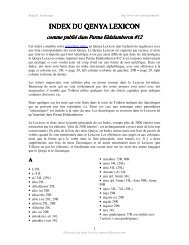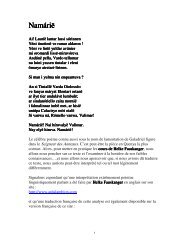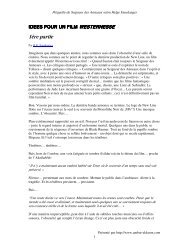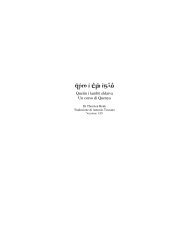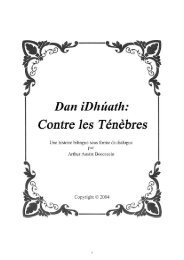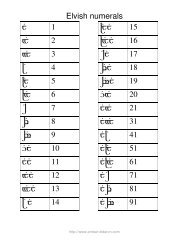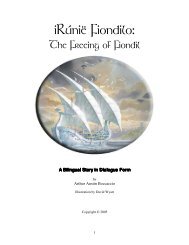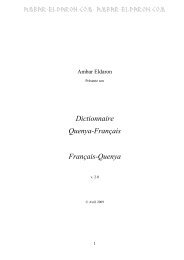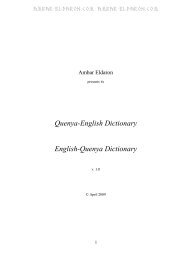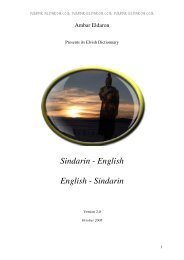Quenya Reverse Wordlist - Ambar Eldaron
Quenya Reverse Wordlist - Ambar Eldaron
Quenya Reverse Wordlist - Ambar Eldaron
Create successful ePaper yourself
Turn your PDF publications into a flip-book with our unique Google optimized e-Paper software.
Helge K. Fauskanger http://www.uib.no/People/hnohf/<br />
(Appendix D), but translated "the first day of Spring"<br />
in the Silmarillion Appendix (SA:cuivië). Early<br />
"Qenya" has coirë ("k") "life" (LT1:257; in later<br />
<strong>Quenya</strong>, the word for "life" is cuilë; however, cf. the<br />
adj. coirëa "living" occurring both in an early and a<br />
late source).<br />
eriocóN Nócoirë alternative name of March<br />
(PM:135)<br />
eriocrE Ercoirë alternative name of<br />
February (PM:135)<br />
erion #noirë "tomb", isolated from<br />
Noirinan, q.v.<br />
erís sírë "river" (SIR), "stream" (LT1:265)<br />
eró órë (1) "heart" (inner mind), also name<br />
of tengwa 21. (Appendix E) Cf. the description of<br />
Galadriel in PM:337, that "there dwelt in her the<br />
noble and generous spirit (órë) of the Vanyar".<br />
eró órë (2) "rising" (ORO), cf. early<br />
"Qenya" órë "the dawn, Sunrise, East" (LT1:264)<br />
erodlop poldorë (not glossed, derived from<br />
polda "strong, burly") (POL/POLOD)<br />
eródnA Andórë full form of Andor, "land of<br />
gift", name of Númenor (SD:247)<br />
eróh hórë "impulse" (KHOR), hórëa<br />
"impulsion" (KHOR) (should probably mean<br />
*"impulsive" instead - Christopher Tolkien may have<br />
misread the gloss)<br />
eról lórë "slumber" (LOS)<br />
erom morë "black" (MOR), "dark, darkness"<br />
(Letters:282)<br />
eróm mórë "blackness, dark, night,<br />
darkness" (MOR, MC:214), also given with short<br />
vowel: morë "dark, darkness" (Letters:282)<br />
erón nórë "land" (associated with a<br />
particular people) (WJ:413), "country, land, dwellingplace,<br />
region where certain people live, race, clan"<br />
(NÔ, NDOR, BAL), also used = "people" (SA:dôr;<br />
however, the normal word for "people" is lië). Early<br />
"Qenya" has nórë "native land, nation, family,<br />
country" (in compounds -nor) (LT1:272)<br />
erónanrA Arnanórë, Arnanor "Arnor",<br />
Royal Land (so #arna = "royal"?) (Letters:428)<br />
erónatseL Lestanórë "Doriath", gen.<br />
Lestanórëo (WJ:369)<br />
eróno onórë "sister" (of blood-kin)<br />
(THEL/THELES, NÔ; both of these entries in the<br />
Etymologies as reproduced in LR have the reading<br />
"onóne", but the "Old Noldorin" cognate wanûre<br />
listed in the entry THEL/THELES seems to indicate<br />
that the <strong>Quenya</strong> word should be onórë; the letters n<br />
and r are easily confused in Tolkien's handwriting.<br />
There is no clear evidence for a feminine ending -në<br />
in <strong>Quenya</strong>, while -rë is relatively well attested; cf. for<br />
instance ontarë = female parent, mother.)<br />
erónemúN Númen(n)órë "people of the<br />
west", confused with Númendor "land of the west"<br />
33<br />
(SA:dôr); hence Númenor as the name of the great<br />
isle given to the Edain by the Valar (FS, LR:56); full<br />
form Númenórë (LR:47, SD:247, NDÛ); allative<br />
númenórenna "to Númenor" (LR:56)<br />
eronewiA Aiwenorë (read *Aiwenórë?),<br />
Aiwenor "Birdland" = lower air (AIWÊ)<br />
erónilaV Valinórë (BAL, NDOR), usually<br />
shortened Valinor, "the land (or people) of the<br />
Valar", *"Vali-land" (Vali = Valar), land of the Gods<br />
in the West (BAL, NDOR); cf. Valandor. In the early<br />
"Qenya Lexicon", Valinor, Valinórë is glossed<br />
"Asgard", the name of the city of the gods in Norse<br />
mythology (LT1:272). Possessive (here object<br />
genitive) Valinóreva in Nurtalë Valinóreva, the<br />
"Hiding of Valinor" (Silm).<br />
erop porë "flour, meal" (POL/POLOD)<br />
erórana anarórë "sunrise" (ORO)<br />
erouH Huorë "Heart-vigour" (masc. name)<br />
(KHÔ-N)<br />
eróvurim miruvórë "meed", "a special wine<br />
or cordial". Also short miruvor. Possessive<br />
miruvóreva "of meed" (Nam, RGEO:66; WJ:399) In<br />
the "Qenya Lexicon", miruvórë was defined "nectar,<br />
drink of the Valar" (LT1:261).<br />
erú úrë "heat", also name of tengwa 36<br />
(Appendix E)<br />
erua aurë "sunlight, day" (SA:ur), locative<br />
auressë "in (the) morning" in Markirya<br />
eruac caurë ("k") "fear" (LT1:257)<br />
erual laurë "gold", but of golden light and<br />
colour, not of the metal. In Etym defined as "light of<br />
the golden Tree Laurelin, gold" - but not properly<br />
used of the metal gold (LÁWAR/GLÁWAR,<br />
GLAW(-R) ). In early "Qenya", however, laurë was<br />
defined as "(the mystic name of) gold" (LT1:255,<br />
258) or simply "gold" (LT1:248, 268).<br />
erualacaM Macalaurë ("Makalaurë"), masc.<br />
name, the mother-name (never used in narrative) of<br />
Canafinwë = Maglor (PM:353, MAK); his Sindarin<br />
name is seen to be based on his mother-name. In the<br />
Etymologies, Macalaurë is interpreted "Goldcleaver"<br />
(MAK)<br />
erualodnU Undolaurë "Glorund" (><br />
Glaurung). Also Laurundo. (LT2:341)<br />
eruam maurë "need" (MBAS)<br />
eruat taurë "(great) wood, forest" (SA:taur,<br />
Letters:308, TÁWAR), pl. tauri in Markirya<br />
erúl lúrë "dark weather" (LT1:259)<br />
erúlap palúrë "surface, bosom, bosom of<br />
Earth" (= Old English folde) (PAL); cf. Palúrien.<br />
erúmoiO Oiomúrë place-name; *"Ever-<br />
?mist" (Silm)<br />
erús súrë "wind", instrumental súrinen "in<br />
the wind" or more literally *"by the wind" (Nam,<br />
RGEO:66, Markirya); Súrion masc.name, *"Wind-<br />
Presented by http://www.ambar-eldaron.com



